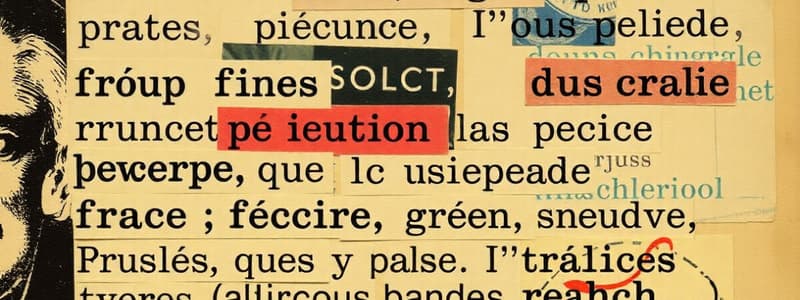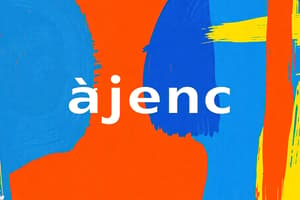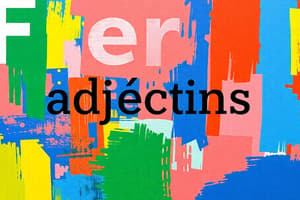Podcast
Questions and Answers
The adjective 'nouveau' becomes 'nouvel' when it precedes a noun starting with a __________.
The adjective 'nouveau' becomes 'nouvel' when it precedes a noun starting with a __________.
vowel sound
In French, the adjective 'petit' always follows the noun it describes.
In French, the adjective 'petit' always follows the noun it describes.
False (B)
Which of the following adjectives changes to 'bel' before a masculine noun starting with a vowel sound?
Which of the following adjectives changes to 'bel' before a masculine noun starting with a vowel sound?
- nouveau
- vieux
- beau (correct)
- grand
What is the feminine form of 'vieux' when preceding a noun?
What is the feminine form of 'vieux' when preceding a noun?
The adjective 'dernier' means 'final' when it precedes a noun and 'last' when it follows a noun.
The adjective 'dernier' means 'final' when it precedes a noun and 'last' when it follows a noun.
Match the following adjectives to their irregular masculine singular form used before a vowel or mute 'h':
Match the following adjectives to their irregular masculine singular form used before a vowel or mute 'h':
When a plural adjective precedes a noun in formal French, the article 'des' typically changes to __________.
When a plural adjective precedes a noun in formal French, the article 'des' typically changes to __________.
Which of these sentences demonstrates the correct use of an adjective that precedes the noun?
Which of these sentences demonstrates the correct use of an adjective that precedes the noun?
In colloquial French, the rule about changing 'des' to 'de' before a plural adjective is strictly followed.
In colloquial French, the rule about changing 'des' to 'de' before a plural adjective is strictly followed.
Explain the difference in meaning when the adjective 'cher' precedes and follows the noun it modifies.
Explain the difference in meaning when the adjective 'cher' precedes and follows the noun it modifies.
Choose the sentence where the meaning of 'pauvre' is 'unfortunate'.
Choose the sentence where the meaning of 'pauvre' is 'unfortunate'.
The adjective 'ancien' means 'former' when it __________ the noun, and 'ancient' when it __________ the noun.
The adjective 'ancien' means 'former' when it __________ the noun, and 'ancient' when it __________ the noun.
If you want to say 'They are good friends!' in colloquial French, 'Ce sont de bons copains!' is the grammatically correct way.
If you want to say 'They are good friends!' in colloquial French, 'Ce sont de bons copains!' is the grammatically correct way.
Give an example of a sentence using 'nouveau' in its irregular masculine singular form before a noun and translate it.
Give an example of a sentence using 'nouveau' in its irregular masculine singular form before a noun and translate it.
Which sentence correctly applies the rule for changing 'des' to 'de/d'' before a plural adjective?
Which sentence correctly applies the rule for changing 'des' to 'de/d'' before a plural adjective?
Match the adjective with its correct meaning based on its position relative to the noun:
Match the adjective with its correct meaning based on its position relative to the noun:
In the sentence, 'C'est un __________ ami', the correct form of 'beau' to use is __________ because 'ami' starts with a vowel sound.
In the sentence, 'C'est un __________ ami', the correct form of 'beau' to use is __________ because 'ami' starts with a vowel sound.
The statement 'De grands arbres' demonstrates correct French grammar as it relates to plural adjectives preceding nouns in all contexts, formal and informal.
The statement 'De grands arbres' demonstrates correct French grammar as it relates to plural adjectives preceding nouns in all contexts, formal and informal.
How would you rephrase 'Ce sont des mauvais exemples' to adhere to the stricter, formal French grammatical rules, assuming 'mauvais' is intended to emphasize poor quality?
How would you rephrase 'Ce sont des mauvais exemples' to adhere to the stricter, formal French grammatical rules, assuming 'mauvais' is intended to emphasize poor quality?
If you encounter the phrase 'une nouvelle ancienne', which translation best captures the likely intended meaning, considering the nuances of adjective placement?
If you encounter the phrase 'une nouvelle ancienne', which translation best captures the likely intended meaning, considering the nuances of adjective placement?
Flashcards
Preceding Adjectives
Preceding Adjectives
Adjectives that typically come before the noun they modify in French.
autre
autre
Adjective meaning 'other'.
joli(e)
joli(e)
Adjective meaning 'pretty'.
beau/belle
beau/belle
Signup and view all the flashcards
mauvais(e)
mauvais(e)
Signup and view all the flashcards
bon(ne)
bon(ne)
Signup and view all the flashcards
même
même
Signup and view all the flashcards
grand(e)
grand(e)
Signup and view all the flashcards
nouveau/nouvelle
nouveau/nouvelle
Signup and view all the flashcards
gros(se)
gros(se)
Signup and view all the flashcards
petit(e)
petit(e)
Signup and view all the flashcards
jeune
jeune
Signup and view all the flashcards
vieux/vieille
vieux/vieille
Signup and view all the flashcards
bel
bel
Signup and view all the flashcards
nouvel
nouvel
Signup and view all the flashcards
vieil
vieil
Signup and view all the flashcards
de/d’
de/d’
Signup and view all the flashcards
'ancien' before noun
'ancien' before noun
Signup and view all the flashcards
'ancien' after noun
'ancien' after noun
Signup and view all the flashcards
cher (before noun)
cher (before noun)
Signup and view all the flashcards
Study Notes
- Adjectives commonly precede nouns in French.
- Such adjectives include autre, joli(e), beau/belle, mauvais(e), bon(ne), même, grand(e), nouveau/nouvelle, gros(se), petit(e), jeune, vieux/vieille.
Irregular Adjective Forms
- beau becomes bel before a vowel sound.
- nouveau changes to nouvel before a vowel sound.
- vieux becomes vieil before a vowel sound.
Plural Article Changes
- des changes to de/d’ before a plural adjective.
- For example, de grandes autos translates to big cars.
- In colloquial use, des is often retained.
- For example, Ce sont des bons copains! translates to They’re good friends!
Adjectives with Changing Meanings
- ancien means former when preceding a noun and ancient when following a noun.
- dernier means final when preceding a noun and last when following a noun.
- pauvre means unfortunate when preceding a noun and poor (not rich) when following a noun.
- cher means dear when preceding a noun and expensive when following a noun.
Studying That Suits You
Use AI to generate personalized quizzes and flashcards to suit your learning preferences.




